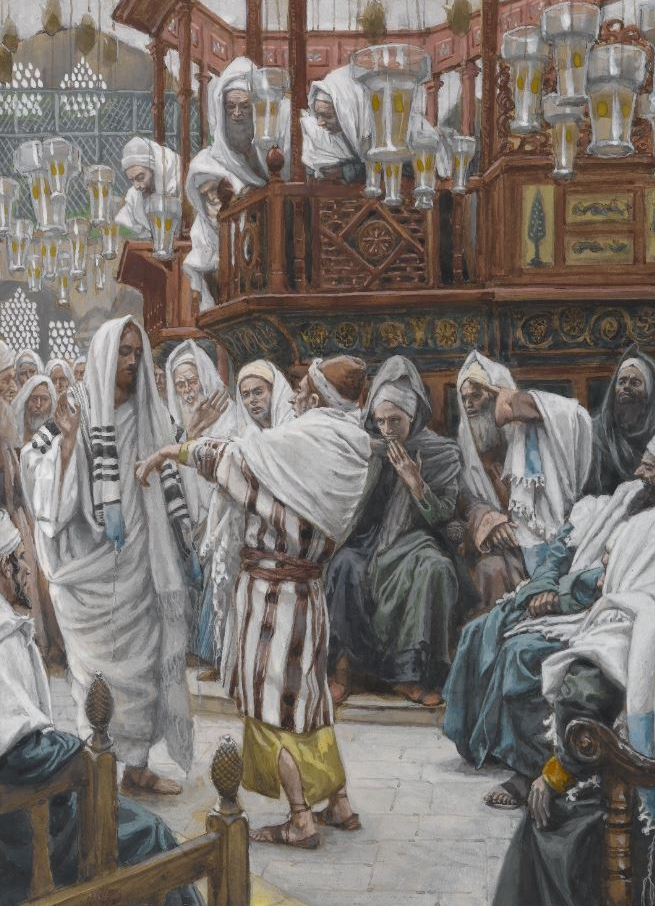
Editor’s note: The following comprises the fifth chapter, first part (A7), of The Gospel of Luke: An Exposition, by Charles R. Erdman (published 1936). All spelling in the original.
7. Jesus Rebuking Blasphemy and Unbelief (11:14-36)
___________________________________________________
14 And He was casting out a demon that was dumb. And it came to pass, when the demon was gone out, the dumb man spake; and the multitudes marvelled. 15 But some of them said, By Beelzebub the prince of the demons casteth He out demons. 16 And others, trying Him, sought of Him a sign from heaven. 17 But He, knowing their thoughts, said unto them, Every kingdom divided against itself is brought to desolation; and a house divided against a house falleth. 18 And if Satan also is divided against himself, how shall his kingdom stand? because ye say that I cast out demons by Beelzebub. 19 And if I by Beelzebub cast out demons, by whom do your sons cast them out? therefore shall they be your judges. 20 But if I by the finger of God cast out demons, then is the kingdom of God come upon you. 21 When the strong man fully armed guardeth his own court, his goods are in peace: 22 but when a stronger than he shall come upon him, and overcome him, he taketh from him his whole armor wherein he trusted, and divideth his spoils. 23 He that is not with me is against me; and he that gathereth not with me scattereth. 24 The unclean spirit when he is gone out of the man, passeth through waterless places, seeking rest; and finding none, he saith, I will turn back unto my house whence I came out. 25 And when he is come, he findeth it swept and garnished. 26 Then goeth he, and taketh to him seven other spirits more evil than himself; and they enter in and dwell there: and the last state of that man becometh worse than the first. 27 And it came to pass, as He said these things, a certain woman out of the multitude lifted up her voice, and said unto Him, Blessed is the womb that bare thee, and the breasts which thou didst suck. 28 But He said, Yea rather, blessed are they that hear the word of God, and keep it. 29 And when the multitudes were gathering together unto Him, He began to say, This generation is an evil generation: it seeketh after a sign; and there shall no sign be given to it but the sign of Jonah. 30 For even as Jonah became a sign unto the Ninevites, so shall also the Son of man be to this generation. 31 The queen of the south shall rise up in the judgment with the men of this generation, and shall condemn them: for she came from the ends of the earth to hear the wisdom of Solomon; and behold, a greater than Solomon is here. 32 The men of Nineveh shall stand up in the judgment with this generation, and shall condemn it: for they repented at the preaching of Jonah; and behold, a greater than Jonah is here. 33 No man, when he hath lighted a lamp, putteth it in a cellar, neither under the bushel, but on the stand, that they which enter in may see the light. 34 The lamp of thy body is thine eye: when thine eye is single, thy whole body also is full of light; but when it is evil, thy body also is full of darkness. 35 Look therefore whether the light that is in thee be not darkness. 36 If therefore thy whole body be full of light, having no part dark, it shall be wholly full of light, as when the lamp with its bright shining doth give thee light.
___________________________________________________
The first of these two discourses, vs. 14-26, was given by Jesus in reply to the charge that He wrought his miracles by Satanic power, v. 15; the second, vs. 29-36, was an answer to the demand that He should compel his enemies to believe in Him by giving them “a sign from heaven,” v. 16.
Jesus had just cast out a demon. His enemies did not attempt to deny that a miracle had been performed; but, in order to discredit Him with the people, they explained the miracle on the ground that Jesus must be in league with the Devil. He replied by showing the absurdity of suggesting that the Devil was casting out devils, or “demons,” for in that case his power would be like a kingdom “divided against itself” and so certain to be “brought to desolation,” or like a house thus divided and sure to fall. Vs. 17, 18. He then turned the charge against themselves: some of their countrymen claimed the power to cast out demons; Jesus did not discuss the reality of these reputed cures but pointedly asked by what power they were effected; is it also demonic power? v. 19. Jesus then declared definitely that His miracles were being wrought by divine power and that their character was a certain proof that He was representing not the kingdom of the Devil but “the kingdom of God.” V. 20. Instead of aiding the Devil, He was despoiling him. He described the Devil as though a strong man, fully armed and guarding his goods, but Jesus himself was a “stronger than he,” and was taking away his armor and delivering his captives by miracles of grace. Vs. 21, 22. In this conflict there can be no neutrality; one must be on the side either of the Devil or of Christ. V. 23.
Jesus then rebuked His enemies by the parable of the Unclean Spirit. The demon of unbelief had once possessed the Jews, and had been manifested in the form of idolatry; it had been cast out, but it had returned with more terrible manifestations of hypocrisy, covetousness, hatred, fanaticism, and pride. Such had been the fate of the nation; and such is the experience of an individual who turns from sin and rebels against Satan but fails to accept the Lordship of Christ. The empty heart is in peril. Reformation is not regeneration. One must beware of the demon of unbelief. Vs. 24-26.
At this juncture a “woman out of the multitude” interrupted with an expression of congratulation for the mother of Jesus. In reply Jesus intimated that His mother might rightly be called “blessed,” but that the woman had missed the real point; it was a privilege to sustain to Christ such a close human and natural relationship, but better far to possess that spiritual kinship which is indicated by faith and by obedience to God. Vs. 27, 28.
Jesus continued to rebuke the unbelief of the Jews as He now turned to answer directly the demand for “a sign from heaven.” He declared that such a sign would be given, in His resurrection from the dead. This miracle would be wrought without any human intervention; it would be a direct act of God and would fulfill the conditions of “a sign from heaven;” it would be the counterpart of the miraculous deliverance of Jonah from the sea. However, the very demand for such a sign was an impertinence and an insult; it reflected discredit upon the divine character of the miracles which Jesus had already wrought. It failed to recognize the nature of His teachings, which surpassed the wisdom of Solomon and the startling message of Jonah. The eagerness of the heathen queen to hear, the willingness of the Ninevites to repent, rebuked the stubborn unbelief of the Jews who refused to accept “a greater than Solomon,” “a greater than Jonah.” Vs. 29-32.
Finally Jesus showed that their guilty unbelief was not due to lack of evidence or to the need of a new “sign,” but to their indifference and their impenitence. As a lamp is designed to light a house, and as the eye is intended to illumine the body, so the soul which is right with God possesses the faculty of spiritual sight. This sight is dimmed and destroyed by sin. The inability of the Jews to believe was not due to lack of “signs” and proofs, but to lack of sight. No amount of light will help a blind man. Those who turn to Christ in repentance and faith and love will find Him to be the Light of the world, and their whole souls will become radiant with divine splendor. Vs. 33-36.
(Go back to previous chapter)
(Continue to next chapter)










5
[…] (Go back to previous chapter) (Continue to next chapter) […]
[…] (Go back to previous chapter) (Continue to next chapter) […]